Keeping Japan Going, Part 2: Konbini love, plus there are angels
I've talked about the awesomeness of konbini, or Japanese convenience stores, before. Actually, almost everyone who has been to Japan raves about the awesomeness of konbini. Like convenience stores elsewhere, konbini are usually open 24 hours a day, and stock things like soft drinks, bottled water, snacks, everyday sundries and more. They just do it better. They are clean, the prices are reasonable (they used to be more expensive than supermarkets, but are no longer, and even have inexpensive house brand items and such), and seem to always have the right combination of items that you need - from gas canisters for your tabletop cooker in the winter, cheap yet sturdy umbrellas during rainy season, the basic fruits you need for breakfast like bananas, and much more.
Not only that, they're also pretty useful places to check out if you want to know what's going on in the packaged-food world in Japan. Where do you go to check out the newest limited-edition soft drinks or strangely flavored potato chips, or cup noodles? A konbini of course. In fact I think that a konbini visit is a must for any first-time visitor to Japan, who's interested in what regular people eat here. (Unless you turn your nose up at such things and only consider what is served at famous or expensive restaurants...)
And of course, they're a great place to get a quick meal or snack. You can't really say most of their offerings are healthy - their inexpensive bentos get a bad rap for being unhealthy, mainly due to being packed with white rice and relying a lot on fried foods like chicken karaage. Their snack breads are fun and tasty, but not exactly good for you. However, the thing that makes the Japanese konbini industry so great is how responsive they are to consumer demands. Recently they've been actively working on improving the quality and variety of their bentos, as well as instituting programs like home delivery of pre-ordered, healthy bentos (see my article over on JustBento about 7Meals).
Konbini stores offer many other services depending on the chain, such as ticket services for various events, ATMs (Note to Americans in particular: if you're on the Plus network you can withdraw cash from 7-11 ATMs in Japan), package delivery services, billpaying, and much more.
In densely populated urban regions like the Tokyo-metropolitan area, konbini are so numerous that people take them for granted. But konbini stores really proved their worth on March 11, and even more so in the days since. On the day and night of March 11th konbini stayed open throughout the Kanto region despite the earthquake. They kept the hundreds and thousands of people trudging home on foot or forced to stay in town in their offices fed and watered. The clean, brightly lit konbini stores were like little safe havens on a dark night. In addition, some of the first stores to re-open in the hard hit disaster areas in the Tohoku region have been konbini, even as "mobile konbini" operating from vans. Here's a Lawson van operating in Sendai.
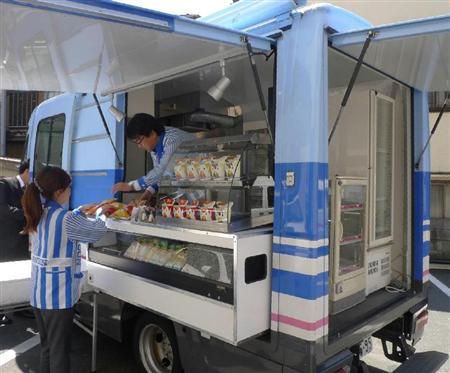
And here's the inside of a 7-11 mobile-store van.
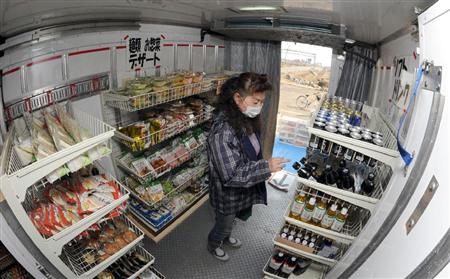
You may have heard news stories right after the quake of stores, including konbini, running out of food and other goods. (I even saw some stories in the overseas "news" media in March claiming people were "starving in Tokyo". Yeah, right.) So, to get a first-hand report I went to talk to the closest konbini from where I am now, the one I compulsively go to at least twice a week. It's a 7-11, which is a good thing since 7-11 is my favorite konbini (love their sandwiches), closely followed by Lawson (great place to get tickets to events and stuff) and Family Mart (carried Muji products!). (Incidentally, there are 9 konbini stores within about a 1 km (.6 mile) radius of where my mom lives in Yokohama.)
The day manager of our local 7-11 is a polite, cheerful 22 year old called Yoshiharu Ito. He was hired by the parent company, Seven and i Holdings, right after graduating from university. He was working part-time when he was in school at a 7-11 so I guess they liked his worth ethic. Most 7-11s are franchises, but the employees are hired, trained and sent by the parent company. Here is Ito-kun.
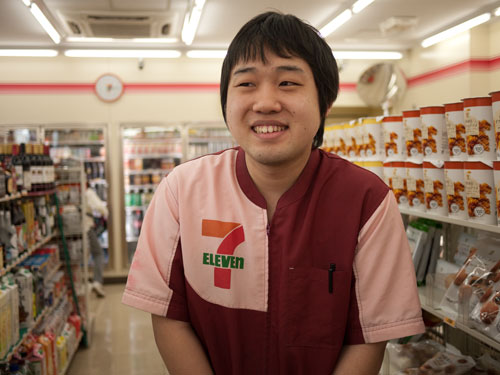
He says that right after March 11 they did indeed run out of certain items. Some of their perishable food items, which are delivered several times a day, were made in factories damaged by the earthquake and tsunami, were not re-stocked for days Then there was the ubiquitous yet to me, inexplicable panic run on toilet paper. Whenever there is some sort of crisis in Japan, people always go for the toilet paper, starting with the "oil price shock" of the 1970s. Ito-kun said that the toilet paper situation was pretty dire for a few days. People were driving to the store from far away to grab any left on the shelves. They even gave out emergency rolls from the stock they had for the in-store toilet to their regular customers for free.
A bit later there was a run on bottled water after the tap water in the Kanto area was contaminated with radioactive substances after a rainfall. Even after the tap water returned to safe levels and people stopped haarding, bottled water was still scarce on the shelves for a rather esoteric reason. It seems that a factory (or factories...since Japanese does not have a plural form unlike Western languages, it's hard to tell unless it's specifically stated) that made most of the bottle caps was damaged after the quake. Incidentally, to get around this problem if something like that happens again, the bottled beverage industry has now agreed to all use the same color bottle cap (white).
Anyway, this is the sign that was still up in the 7-11 as of early April. It says in the politest terms that there was a 1 liter of water per family limit. ("Per person" is crossed out. I wonder if parents were bringing in their kids and trooping out with a bottle per head.)
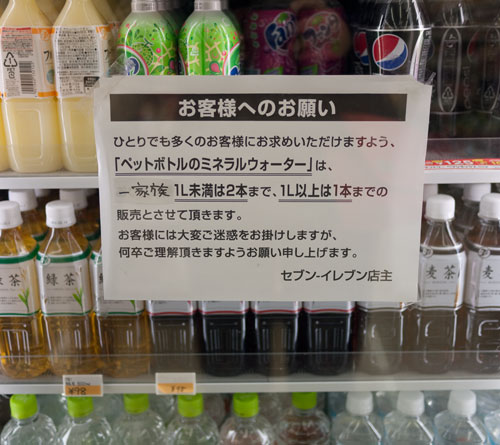
A similar sign was posted in front of the toilet paper and the tissue paper boxes too. Both signs were taken down in late April. And I should note that people did not have to go thirsty by any means, since no other beverages were restricted, nor did they run out (with the exception perhaps in some stores, not this one, of a few days when a few people overboard with the hoarding). Tea, juice, soft drinks of all kinds were still in stock. (Parents of infants who needed clean water for formula were given free bottled water in affected areas, as well as given priority in stores.)
Finally, another product they ran out of initially was the all-Japanese emergency food, instant cup noodles. Again, these photos were taken in early April. Ito-kun claimed that they were still quite a bit lower on stock than usual and that they had instituted some 'tactical shelving' techniques, but it's hard to tell.
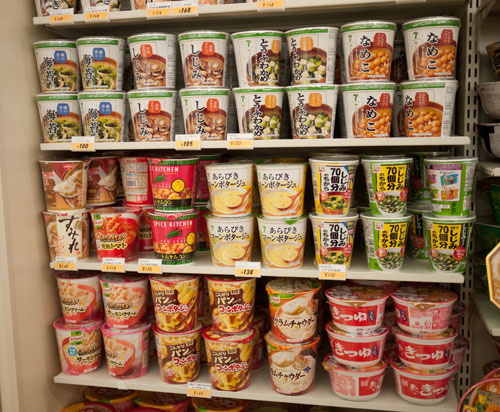
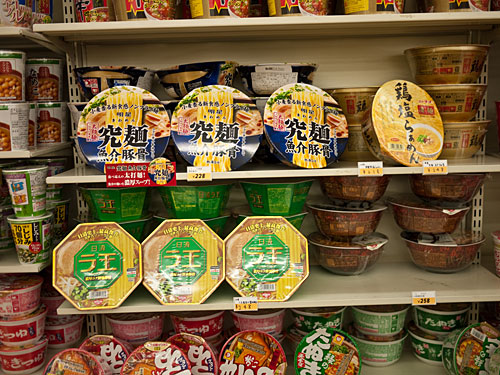
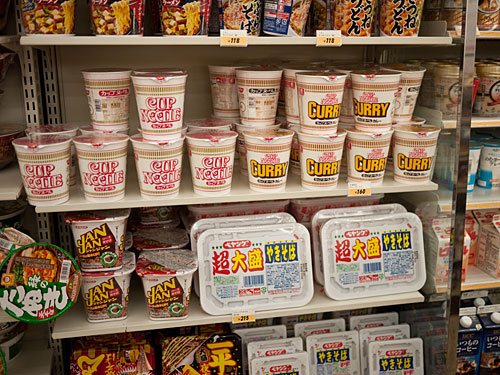
Another issue facing all businesses is the power shortage problem. Again, konbini chains were among the first to institute changes to their stores to cut down on power use. Store lights were dimmed or partially turned off and the temperature in the refrigerated cases was turned up 1 degree. As of this writing they've already started instituting more long-term solutions, such as solar power panels and LED lights too. (Ito-kun said that for the first few weeks when the power shortage situation was serious, they kept the Yahoo! Japan home page open, where they have a power-use monitor bar. If the bar was rising too much they'd shut down more lights or even turn off a refrigerated beverage case and so on.)
I asked Ito-kun his thoughts about March 11 and subsequent events, and the role konbini plays in Japan. He thought a bit and said that it made him realize just how embedded in the fabric of everyday life konbini like the one he works at is, and how much they are appreciated and relied upon by the people in the community. I think he is exactly right.
A toilet paper postscript
The toilet paper shortage situation was pretty bad for a few days. You might think it's not such a big deal, since many Japanese households have Washlet-type toilet seats installed that rinse your delicate parts with a gentle spray of warm water. But for my mother, it was pretty dire. She has a condition called ulcerative colitis, and had her large intestines surgically removed last year. Since then she has had to go to the bathoom nearly 20 times a day. So she goes through quite a lot of toilet paper...and she was down to her last roll. She and my stepfather went to line up at the supermarket early in the morning in hopes of getting their hands on the latest shipment, but it was all gone way before it was their turn. She wasn't one of the customers who got a free roll from Ito-kun, but she did get one from Takashimaya's staff, and even resorted to taking a little extra paper from public toilets.
I rather jokingly mentioned my mom's toilet paper problem on Twitter back in March. And...someone I've never spoken to directly before, who lives in Chiba prefecture and follows me there and on my blogs, wrote to me offering to send her some, since there hadn't been a run on toilet paper in her area! And, she did. She may be mad at me for this but I'm outing Cherie, aka Rzmom on Twitter, as the kind toilet paper angel. People like Cherie give me a little hope for humankind. ^_^
(This is Part 2 of a 2-part series. Be sure of check out Part 1, about package delivery services.)
If you enjoyed this article, please consider becoming my patron via Patreon. ^_^

 Welcome to Just Hungry, where we serve authentic Japanese recipes and more! I'm
Welcome to Just Hungry, where we serve authentic Japanese recipes and more! I'm 














Comments
Soos
27 May, 2011 - 10:41
Permalink
Re: Keeping Japan Going, Part 2: Konbini love, plus there ...
That was lovely of Cherie to help your mom! Folks in Hawaii hoard toilet paper, too. I think it's third after white rice by the 20-lb. bag and cases of water.
gaininja
27 May, 2011 - 10:46
Permalink
Re: Keeping Japan Going, Part 2: Konbini love, plus there ...
One of the best things about konbini's is that they all have toilets. Here in London there are no toilets everywhere - we usually have to find a McDonalds or just hold it till we get home. There aren't even any in the underground. In Japan they're everywhere, and you only have to buy a pack of gum to say thanks! So useful :)
Charlotte
27 May, 2011 - 12:12
Permalink
Re: Keeping Japan Going, Part 2: Konbini love, plus there ...
When reading this, I realised again why I love Japan so much. Everyone is really doing everything they can to help out, people help each other, and they`re keeping calm about it.
Everyone is doing their share, I love seeing that. It would never happen here in the Netherlands.
Also, I absolutely love konbinis. We don`t have them here! Even though I`ve been back in Holland for almost a year now, longer than I`ve been in Japan in the first place, I still get midnight urges of feeling like onigiri, and I`m all ready to grab my bag and walk out, just to realise I can`t, because nothing is open here between 9 pm and 8 am.
In fact, the last day in Japan, before I went to the airport, I ate mainly konbini food, as a goodbye.
If there`s one thing I miss like insane from Japan, it`s the konbini. Especially the 100 yen Lawson. For obvious reasons (student budgets XD)
NevTheRaven
27 May, 2011 - 14:06
Permalink
Re: Keeping Japan Going, Part 2: Konbini love, plus there ...
Thumbs up for the konbini. When I was in Japan last summer not only they provided cheap meals and snacks but also cooling moments in the humid japanese heat
inktwig
27 May, 2011 - 15:44
Permalink
Re: Keeping Japan Going, Part 2: Konbini love, plus there ...
Hoarding toilet paper must be a universal thing ^_^ here in Virginia, a snow storm warning will send people to the store for toilet paper, milk and bottled water.
The konbinis sound wonderful!
Maiyim
27 May, 2011 - 17:59
Permalink
Re: Keeping Japan Going, Part 2: Konbini love, plus there ...
Great writing, Maki, as always. You've really helped me appreciate konbini in a whole new way! I usually disparage their bento, avoiding them unless desperate, and dislike the way they displace older neighborhood shops. Now i appreciate the service they do. And I confess, when i need a quick snack in town, it's almost always yummy, greasy, salty konbini kara-age fried chicken for me! Nihon Kudasai - Two sticks, please!
MN
27 May, 2011 - 18:39
Permalink
Re: Keeping Japan Going, Part 2: Konbini love, plus there ...
Ohhh thank you for posting this! I love konbini! And I'm really glad someone was able to help your mom with her toilet paper problem. As I said previously, I really like the touches that you add to Just Hungry like this. :)
I read your post at Japan Times and saw the picture with the farmer. And the large snake that was in the picture too. I'm sure it was harmless (and probably attracted to the small wildlife in the area), but I was like "Snaaaake!!!"
anon.
28 May, 2011 - 08:12
Permalink
Re: Keeping Japan Going, Part 2: Konbini love, plus there ...
Thank you for your posts.
Not to be pedantic: the second mention of 1KM has "1.6 mile" in the parenthesis. It should have been ".6 mile" as it was in your first mention of 1 KM.
maki
29 May, 2011 - 04:12
Permalink
Re: Keeping Japan Going, Part 2: Konbini love, plus there ...
Oops - corrected now! Thanks for pointing that out (as you said it's the other way round)
pickyin @ LifeI...
28 May, 2011 - 09:55
Permalink
Re: Keeping Japan Going, Part 2: Konbini love, plus there ...
I'm one of those following your tweets after March 11 and couldn't figure out why your mum was so urgent with the toilet paper situation. Now I know!
Your article made me appreciate 7-11 more, I think we take these 24-hour stores for granted. I can recall right now to the many situations I was caught in the past running to them for urgent supplies of something. Thank you!
sachie
28 May, 2011 - 12:43
Permalink
Re: Keeping Japan Going, Part 2: Konbini love, plus there ...
Great article - konbini are what I miss most when I'm back in London, and they're my first port of call when I get back to Tokyo! (BTW, just a quick note: you say 1km is 1.6 miles, but that's actually back-to-front. 1km works out around 0.6 miles, I think.)
sea
28 May, 2011 - 18:21
Permalink
Re: Keeping Japan Going, Part 2: Konbini love, plus there ...
Maki,
What a wonderful article. Thank you for sharing this thoughtful article on konbini and the aftermath of March 11th. Having lived in Japan for several years and stayed there for several summers, I feel a connection and love for Japan (and its konbini!) and it is good to hear this kind of report of the impact of the earthquake on something so much a part of daily life in Japan. I enjoyed meeting Ito-kun and as always, enjoyed your writing.
Best wishes and good health to your Mother- I'm so sorry to hear about her health condition. I am however very happy to hear that there are tp angels on Twitter from Chiba! (I happened to live in Chiba too.)
All my best to you and your family,
Sea
Okihwn
29 May, 2011 - 03:07
Permalink
Re: Keeping Japan Going, Part 2: Konbini love, plus there ...
What I love about the kobini is when it's oden season. So nice to be able to get oden quickly and easily!
anon.
13 January, 2014 - 06:25
Permalink
Re: Keeping Japan Going, Part 2: Konbini love, plus there ...
how do you take oden ? we can just go there take the cup and fill it ? or they do it?
maki
14 January, 2014 - 20:37
Permalink
Re: Keeping Japan Going, Part 2: Konbini love, plus there ...
You ask for the pieces you want, and a store attendant packs it for you.
Gaijin Farmer
29 May, 2011 - 06:40
Permalink
Re: Keeping Japan Going, Part 2: Konbini love, plus there ...
Thanks for the post! Lawson Station is one of my great memories of my first incredibly hot summer in Japan more than ten years ago. 100 yen ice creams and cold drinks... Although I don't like convenience stores in theory, the blue and white sign is still a sort of friendly comfort.
On a bicycle trip around Hokkaido we discovered other chains that carry even fresher, better food.
It's been very nice to see companies stepping up with a sense of social responsibility, especially given the poor example set by Tokyo Electric and the national government! I think I may go get myself a natto roll when this typhoon passes. ;)
erisgrrrl
29 May, 2011 - 06:51
Permalink
Re: Keeping Japan Going, Part 2: Konbini love, plus there ...
It's interesting to see that "emergency hoarding" is pretty much the same everywhere! When we get threats of snow or even just too much rain you can bet there will be zillions of people at the grocery buying up all the toilet paper, bottled water, bread and (for some strange reason) milk.
Manu
29 May, 2011 - 19:54
Permalink
Re: Keeping Japan Going, Part 2: Konbini love, plus there ...
I love sebun-erebun! You brought back some serious nice memories with this post. Thank you Maki and ganbatte in Japan!
Justin C.
3 June, 2011 - 01:59
Permalink
Re: Keeping Japan Going, Part 2: Konbini love, plus there ...
7-11 started in my hometown of Dallas, Texas. Back in the 1980s it was bought by a Japanese company and they laid off most of the corporate workers here. It was a very big news story here, for years. I don't remember, as a kid, having an opinion of the situation other than people I knew had lost jobs over it. It was a sore spot for us, for a long time.
When I visited Japan for the first time a few years ago I got to visit a Japanese 7-11 for the first time and I truly appreciated how valuable it was to the community. Every time I go to Japan, I am sure to eat a large portion of my meals from their amazing onigiri selection.
It is not only healing for the Japanese people, but also to me ^_^
Eileen
5 June, 2011 - 02:34
Permalink
Re: Keeping Japan Going, Part 2: Konbini love, plus there ...
Hi Maki,
First time commenting, but have been reading both your blogs for quite some time. Love them : )
My son lives in Kawasaki, and his big complaint after the earth quake was that he couldn't find his beloved natto. It took several weeks till he was able to find it on a regular basis.
I also love the konbini onigiri when I'm there visiting : )
I love when you go home to visit and give us reports like these. Thanks.
Britt von strange
5 June, 2011 - 19:22
Permalink
Re: Keeping Japan Going, Part 2: Konbini love, plus there ...
I come here to find out what is going on in Japan since you are more truthful. I am so glad your family is ok :3